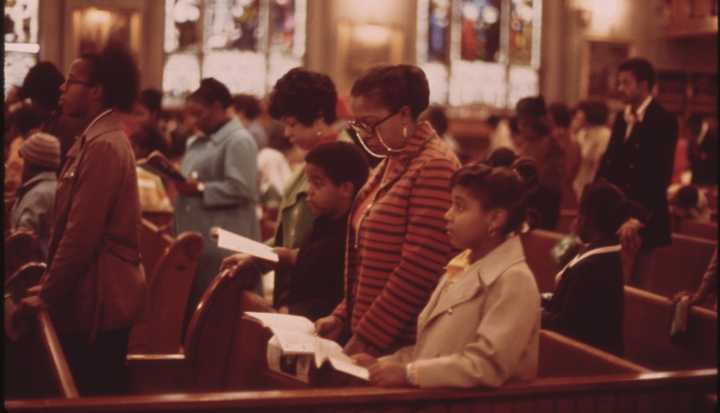Editors’ note: This interview originally appeared in our March 1983 issue. In this interview with U.S. Catholic staff, Sister of Notre Dame de Namur Teresita Weind speaks about her experience working in the Cabrini Green housing projects in Chicago, the alienation of many black Catholics from the broader church, and the need for better education among black Catholic communities.
When Sister Teresita Weind came to Chicago, she didn’t start out in one of the more fashionable areas of town. Her first job in the city was at a mission in the Cabrini Green housing project, brought to national attention in 1981 when Chicago Mayor Jane Byrne moved their following a series of murders in the complex.
Jane Byrne lasted one month in Cabrini. Teresita Weind stayed for five years. She is now on the staff of St. Catherine-St. Lucy Parish, an integrated parish which straddles the border between Chicago and the suburb of Oak Park. While working in the parish, Weind has seen the struggles of racial tension firsthand. For example, while the community that worships in St. Catherine’s Church on Sunday is 60 percent white and 40 percent black, less than a handful of white children attend the parish school. But Weind says that may be changing: “We have about ten white families who are trying to figure out ways to put their children back into the parish school, which is 99 percent black. The parents are even willing to take on the tuition. They’re putting their money where their mouths are.”
Weind says black Catholics have a long way to go before they’ll be considered full members of the Catholic Church. “Right now we black Catholics don’t own the church at all. It’s obvious that we don’t. It’s obvious in the leadership, it’s obvious in the way our churches are supported.”
What can white Catholics do? “Not run from us. Literally. Maybe you can live on the borders of the black community so there’s more access, a chance for the two races to relate to one another, and to go to the same schools and churches. And be patient. I realize that people get that feeling of ‘Well, I’ve worked at this a long time and nothing’s happening and I’m tired.’ Maybe somewhere, someplace, people can find a little more drive to stay with the cause.”
How long have you been working with other black Catholics?
I came to Chicago in 1969 and I’ve been here ever since. The reason that I came is specifically related to Martin Luther King’s assassination, even though at the time he was killed I didn’t even know who the man was. It’s embarrassing and somewhat humbling to say that, now that I’ve learned as much as I have. But when I entered the convent in 1960, right out of high school, postulants and novices did not read newspapers, did not listen to radios, and did not watch television. Most of the civil rights movement passed right on by without my being aware of it and definitely without my being involved in it. In 1968 I was in Bismarck, North Dakota working toward my bachelor’s in nursing, and the announcement came over the P.A. system through the convent that Dr. King had been assassinated. I really didn’t know what that meant.
Fortunately, a friend of mine, a Benedictine priest from Peru, Illinois, was very much aware of what was happening in the civil rights movement. I asked him to come that same summer for the ceremony when I made my final vows. Largely through him and other friends of mine, I realized the significance of Dr. King’s assassination.
A lot of changes happened to me very fast. I realized that I did not want to work in a hospital with all white people when there was so much happening in other parts of the States, particularly here in Chicago, where I could be ministering in a black community. I came to Chicago in the fall of ’69 and worked with the Benedictine priests and sisters in Old St. Joseph’s in Cabrini Green. When that mission was closed, I went to work for the diocese in 1974, and I stayed for six years until I came to St. Catherine of Siena-St. Lucy, where I am now. My main work there is on the Rite of Christian Initiation of Adults (RCIA), which I thoroughly love.
Have you felt much prejudice against you? Being a black Catholic woman, you’re certainly not in the majority.
It has really affected my work in some ways. I remember that in 1960, when I decided to enter the convent out of high school, there were religious order who were either not accepting black girls or taking only so many. A number of places refused me either because they wouldn’t take me or because they had reached their quota for the year. And 1960 is not that long ago, when you think about it.
But in my own work in some of the missions in the inner city, I’ve certainly experienced how hard it is to be black and Catholic and how much harder it is to be poor, black, and Catholic. So in that sense, I’ve had the experience of and direct involvement with prejudice. But as far as my own ministry, I really can’t cite any one major obstacle in being a woman, a black woman, a religious woman, and a Catholic woman. It just hasn’t happened. The other side of it, though, is awkward too—that is, because I’m an educated woman, and because I speak well, I get the other side of prejudice: “Certainly you can’t be black because you don’t act like black people.” I don’t even know if I can describe how that hurts, but it does hurt. That kind of stereotyping has its own way of trying to pull me away from the very community I belong to, and want to belong to.
You mentioned that you work with RCIA. Do you find that the Rite is any different in a black parish than in a white parish? And why do you think it’s significant in the first place?
The reason that I have liked it and continue to support it is that it allows time for a person to pursue an institution, the Catholic Church, and to figure out whether they really want to be a part of it. And it does make a lot of sense for a black parish to use the Rite of Initiation, if it’s done well. I’m speaking from experience here. I became a Catholic at age 12. I was raised Baptist, and for years my mother was against my becoming Catholic. She’s a Catholic now, and a very faithful Catholic. But most of the black people I know became Catholics under pressure. You know the story of the parishes which required that parents take instructions to be Catholic is their children were attending the Catholic school. Well, my mother took the instructions every year but never became a Catholic. She just resented the whole thing, number one. Many people went on with the instructions and became Catholic, but they never really became invested or involved in the church.
I think the RCIA process gives people the time to decide whether they want to become part of the church; if they do, it gives them some concrete and necessary steps to get involved and to really own this Catholic Church. Right now we black Catholics don’t own the church at all. I certainly wouldn’t want to give the impression that we belong to the Catholic Church. It’s obvious that we don’t. It’s obvious in the leadership; it’s obvious in the way our churches are supported. It’s obvious in the attitude the dioceses still have about black parishes in the city. But I still believe in the Rite of Initiation and the little bit of hope in that process for us to feel more a part of and to take some ownership of this Catholic Church. And I like the church. I feel at home in it. I wouldn’t consider going anywhere else.
What are some of the problems that candidates for initiation have with the church?
One is the white clergy. Another is the laws of marriage. And another, although this is losing some ground, is the sacrament of Penance. It’s a problem especially with Baptists who don’t believe in confessing their sins to any human being. Lots of them would say, “If that’s what it means to become a Catholic, it’s out for me, because I’m never going to take part in a rite where I have to say what I have done wrong.” Although since so many Catholics aren’t using the sacrament either, I can’t say that’s much of a reason anymore.
Another thing which is just surfacing recently is a reaction against a kind of paternalism in the way that charity is doled out. You’ve probably heard the old saying that when you give people a fish, they’ll always need fish; but if you teach them how to fish, they’ll always have food. Some of the adults who are considering joining the Catholic Church are saying, “I don’t like it because fish are still being given out. You’re not teaching us how to fish. We come to the parish and we get handouts, but there aren’t enough long-term educational opportunities to make us feel that we belong here.”
I see that attitude on the rise. And it’s almost a trap—I mean, when someone comes and asks for something, what can we do but give them what they need? And yet, I agree, we ought to be doing more education.
If you were in charge of spending a $50 million budget for black evangelization in the Catholic Church, how would you spend it?
Good question. I would definitely pour a lot of it into education.
Religious or secular?
I wouldn’t make the distinction. I would pour it into wholesome education for black people top train other black people. I’d use it for psychologists, nutritionists, grammar-school educators, high-school educators, for people in special education. I’d open up centers for job training like we had when I worked in Cabrini Green—get the tools we need to teach skills, the big equipment we need, and teach youth how to use it. I suppose we’d have to have computers nowadays, but I’d get whatever things are needed and train people how to use them and how to teach others. It wouldn’t be only to give out money for groceries or to fill immediate needs.
Do you think the people who need these skills would be willing to enroll in programs like you’re describing?
I think so. And the reason I say that is because it’s utterly hopeless to do nothing. Even if they started training in 1983 and wouldn’t see any concrete results until 1988, people would still be going through a wholesome development during those years—they’re being treated as developing human beings and not just being written off as numbers or property.
If the white institutional church is going to get a better understanding of the real needs of the black community, will the impetus for that have to come from the blacks or the whites?
It would have to come from the black community. My intuition is that the movement out of the city into the suburbs is an indications that the white church does not want to be bothered with the black church or black parishioners. So the impetus for any understanding would have to come from us. And I’m sure it would be a very messy and ugly thing for many years. It would also take some mighty strong black people, and I hope we’re here.
What about the “twinning” concept, where a white suburban parish used to team up with an inner-city black parish and contribute funds and other kinds of help?
The principle of it was good. But the practice of it just didn’t work. One of the reasons it didn’t work was because we were always expected to go to the suburbs. It’s rare that people from any suburban parish would come and spend so much as an hour worshiping here with us in the city. I know that firsthand because, when the twinning program started, I was working here in the diocese and I went with many black groups out to the suburbs. We were there and they were nice to us, but then we left. And when it was time to do the reverse, it never happened except in two instances. The people from one parish in the suburbs came and helped to clean up one of the inner-city churches, but that’s one of only two or three twinning relationships which actually worked both ways.
What do you think is the cause of that? Is it prejudice or is it fear?
Well, prejudice is fear, isn’t it? The reason I don’t want to be near someone is because I’m afraid they’re different from me, and so I’m afraid of them. So yes, it’s fear. One woman in our parish told me this year that I was the first black person she had ever worked with, and that her children had never been to the city. And that’s not unusual at all. Kids are growing up not even knowing that we exist. And you can’t develop compassion and brotherhood and fellowship for a community of people who live miles and miles from your situation.
I wouldn’t say that I’m afraid of black people, but I am afraid of being killed or robbed or mugged. Sometimes I’m afraid to ride the elevated trains or the subway. Do I have any Christian responsibility to ride the el?
I don’t think so. I’m afraid to ride the el too. I came here today on the el and I watched my purse. That’s the kind of fear that comes from knowing that there are many black people who are just plain crazy from drugs and alcohol. That’s just the symptom—it’s the result of unemployment, it’s the result of poor self-image, it’s the result of loss of dignity.
How do you fight these conditions in a parish? How do you help people keep their dignity when they’ve lost their jobs? It’s not hard to understand why people would want to fight back.
I’m constantly trying to work on what it means to be a human being rather than the model American—the successful, productive, consumer individual. And it’s hard to keep on saying that, because, with the way many of us have been raised, there’s a strong sense that “I have a right to all of this wealth, even though I may never get it.” And that’s erroneous, I believe. I don’t think it’s even human to cultivate that type of attitude. This is not what it means to be human, to work for all this nonsense. This is not what makes you a person—to increase your possessions.
I also stress that we do not have the right to return what is doled out to us, meaning prejudice, hatred, and racism. No matter how many times I am hurt, I never have the right to hurt back, and that’s a hard thing to keep on saying. There are many people who sit in church on Sunday, and they’ve brought their hurt from the week—hurts I have not even experienced. But we still do not have a right to hurt back. I don’t have the right to go and burn your house down because you put a burnt cross on my lawn.
When you’re facing people who don’t know where their next meal is coming from, is religion a luxury? Do you have to feed the stomach before you can feed the soul?
It depends on how you look at religion. We blacks came here as a religious people from Africa. And we adapted Christianity to our religion and to the very deep sense of humanness, some of which was touched on in the great saga of Roots. So for us, feeding the stomach is a religious act.
Religious is respect for the other human being. Religion is feeding the hungry. Religion is exactly the way the Gospel describes it: visiting the sick, visiting the imprisoned. We don’t have to wait until that’s done before we can talk religion.
So in that sense, it’s good to know that we differ from the religion of America which seems to be still hung up on the theology and the jargon that identifies a person as a religious person in contrast to that deep humanness which is in itself a religious experience.
When someone comes to us and they’re hungry, the manner in which we respond to them is in itself a religious experience. If I give it to you and I won’t look you in the eyes, or if I deny that you are here as a human being and if I want to wait until you look like I look and smell as good as I do—that’s not what religion is all about.
Unfortunately that is one form of religious practice in this city. But if you need something and I look you in the yes and respect you and address you as a human being, and in the process I feed you, that’s religion.
Do the blacks and whites “look each other in the eyes” in your parish? Do they live on the same blocks, or is the area pretty segregated?
There’s a little of both. In part of the parish there’s an effort to maintain a quota of residents of different races and ethnic groups. And so some of our black and white parishioners live together on the same blocks or in the same apartment buildings, work together, babysit for each other, go out together.
We claim that we have more interracial families in our parish than in any other. I don’t know if that’s true, but we certainly have a lot. Our suspicion is that people settle there because they feel comfortable; they know they can raise their children in that parish boundary and in that community without too much of a problem.
Do you think the blacks and whites in your parish have learned a lot from each other?
Yes. And it’s slow—very slow. I deliver a homily there nearly every week, and some things I do very gingerly because the worshiping community on Sunday is still 70 percent white. A few months ago I “broke out,” as we say, and did something more black. And there was some scuttlebutt. People didn’t like it, and those who didn’t were mostly white. The black people said, “Great. Do it again.”
What did you do?
Gospel music, more of a change in my preaching tone—a different tone of voice, that kind of thing.
Has it been your experience that white people always react negatively to that? And that black people always like it?
No, I couldn’t say that. I’ve worked in a lot of black parishes in Chicago, and I used to think that most black people would like the same things, the same kind of music. But I was educated quickly.
There are some mighty conservative black people out there, and they don’t want to have anything to do with anything that even smells Baptist. That’s the way it gets divided, usually—either it’s Baptist or it’s Catholic. For some older black Catholics, there’s still that sense of having “made it” once you become Catholic, that it’s a step up from these shoutin’, Free Church of Christ denominations, and a little more sophisticated. They didn’t want anything that would deprive them of being just like the Catholics in the cathedral downtown. But then there are other places where the people really want to be both black and Catholic.
What would be some of the components of a black liturgy?
For sure more of a sense of community and warmth. A respect for letting the emotions be felt and respecting the highs and lows that happen in any worship service, in contrast to a more straight, unchanged feeling during worship.
Also a desire for music to be prayer. That may sound strange, but what I see in some places is that music is a pause in the prayer of the Eucharist. You stop praying to let the choir sing, whereas in black worship, the music is the prayer. And if it takes more than 30 seconds to complete the song, that’s all right. That’s prayer. You can’t just stop it after the second verse. If we could finally sort out a few things that would be universally black and Catholic, I think music as prayer would be one of them.
You mentioned before that you thought the black community would have to make the first move to improve racial relations in the church. What can the white community do differently as well?
Not run from us, literally. Not run from us.
I know a number of white people who are not running—people in my own parish, people in other parts of the city who just don’t seem to have that flight mentality. In fact, we have about ten white families in our parish who are trying to figure out ways to put their children back into the parish grade school, which is now 99 percent black. The parents are even willing to take on the tuition, which is $650 per year for one child—and this is in contrast to no tuition at all if they send their children to public schools.
These families are genuinely interested in see that, number one, their children get a Catholic education and, number two, they put their money where their mouths are. They say they believe in an integrated parish and an integrated parish school, and many of them are planning to start their children in preschool or first grade.
Do you have any final thoughts?
All I can say is: Be patient. I realize that people have that feeling of, “Well, I worked at this a long time and nothing’s happening, and I’m tired.” Maybe somewhere, someplace, people can find a little more drive to stay with the cause.
People can also be really honest about the inequities that still exist—that this society will hire a white non-diploma young man or woman over a diploma-graduated black youth. Be honest about that, and call your friends on the carpet about it.
If you see racist behaviors happening among your friends, be honest and say, “You’re participating in the same kind of racist behavior that’s going to continue these inequalities.”
When I hear some white people say, “What else could we do?” I just want to say that there are other things to do. You don’t have to hire that way. You don’t have to have policies like that. Maybe you can decide to live on the borders of black communities—admittedly because of the fear of living right within a very hardcore black community. But at least live on the borders so there’s more access, a chance for the two races to relate to one another, and to go to the same schools and churches. That’s some of what can happen.













Add comment